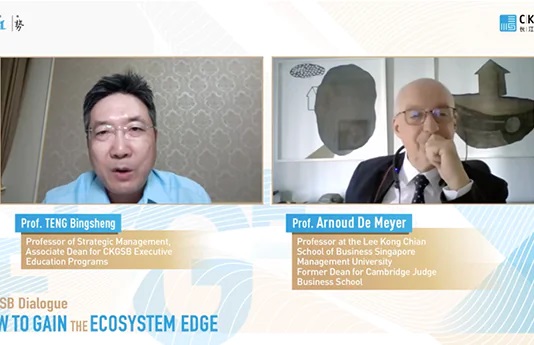The Fosun Group, a Shanghai-headquartered conglomerate, has diverse business interests ranging from insurance and healthcare, to retail, steel and mining. Founded in 1992, Fosun has already made it to the list of China’s top enterprises—in 2011, it ranked 81st among the top 500 enterprises in China ranked by Fortune. The group attributes its success to opportunities that capitalize on “China’s growth momentum”.
Starting in 2010, Fosun began to make global moves—in June 2010, it acquired a 7.1% equity interest in French premium resort hotel chain operator Club Med and in April 2011, the group invested in Greek fashion retail company Folli Follie.
In this interview with CKGSB’s Case Study Center, Liang Xinjun, Vice-chairman and CEO of Fosun Group, talks about the group’s global M&A strategy.
Excerpts:
Q. Chinese enterprises have been acquiring global companies for some time now. What do you think is driving this trend?
A. Overseas acquisitions by Chinese enterprises in the past, including those of Fosun, were able to happen mainly because of China’s capacity as the largest manufacturer in the world. We sold Chinese products through acquired overseas channels. Later we introduced raw materials, technology and brands in order to make products in China and also sell them all over the world. However, things have changed greatly in the last 2-3 years. First, China has quietly become the country with the third-largest consumer market in the world, and has a recorded annual consumption growth of over 15%. However, we still lag far behind by the US in the proportion of consumption in GDP (35% versus 70-80%). In other words, China has the potential for attaining a substantial and consecutive growth in consumption. As a large consumer, what are the targets of M&A? We should focus on those European, US and Japanese companies which are willing to make profits in China and have great growth potential.
Secondly, China had a lot of capital before anyone was aware of it, but it is not leading in all indices for a ‘capital giant’. However, China tops the world in terms of the number and amount of IPOs. Last year, the number of Chinese IPOs accounted for about 42% of the world’s IPOs, and the financing accounted for over 51%. From the perspective of capital market value, China still maintains its market value at the second place despite a decline in its ranking among the first three in the world. Therefore, we should also pay attention to wealth management in the capital market when making investments, for example, M&A and joint ventures relating to the Chinese subsidiaries of the top 500 enterprises in the world. It is certain that the M&A models adopted by Fosun in recent years are significantly different from those in the past.
Q. Given this background, what are Fosun’s strategic objectives? How do M&As tie into your strategy?
A. In my opinion, in the next decade or so, the world will experience fundamental changes which can be called a ‘rebalancing’. Simply speaking, Europe and the US should increase their savings and reduce consumption—this principle is the same for individuals, enterprises and countries. However, the Chinese people, enterprises and even the government should consume more and reduce savings, so as to contribute to the rebalancing of the world. What benefit does China have as the major driving force of global economic growth in the future? In the US, during the 1980s and the early 1990s, many companies ranked in the global top 10 of their industry though they were not global operators. The same thing will also happen in China. A company can make it to the global top 10 by investing only in China. Therefore, from the perspective of investment strategies, we should not only concentrate on immediate interests, but also on the discovery of those companies which can make it to the global top 10 in the future while only conducting business in China.
Secondly, we are clearly aware that the European and US markets may even shrink instead of enjoying rapid growth. So we should try to discover companies (European and US) which will perform well in China. We make investments in order to help them develop in China. As an investor, in the long run we only invest in those enterprises which will benefit from China’s rise and development. Certainly, we first choose domestic enterprises and then choose those global enterprises which will grow in China.
Q. What are some of the challenges you face during an investment or acquisition?
A. In our investments we do not focus only on the source of opportunities, but also on representative challenges. Our challenges mainly come from three areas. First, there is the challenge of the original controlling shareholders. We make acquisitions with goodwill and we will definitely not make an acquisition if the original shareholders oppose. Believe me, I will not influence the controlling status of the original shareholders even if I become the largest shareholder. I only want to have influence on Chinese strategies, and the remaining things are up to the original shareholders. This is very important.
The second challenge comes from the team. In the face of new shareholders coming suddenly, the overseas companies will certainly worry about the assignment of Chinese CEOs or general managers, which is a common occurrence during M&As in China. However, I think that we will not make the acquisition if an overseas company wants us to assign Chinese staff or employ staff all over the world for it. We only invest in those companies with very excellent teams that have clear Chinese strategies and prepare well for the structure. For example, Club Med, a company in which we have invested, divides the global market into Chinese market and the non-Chinese market, and the Chinese market is directly under the management of the CEO. The company highly values the Chinese market, which is what I want. I expect the same from Folli Follie.
Third, opposition is likely to come from trade unions, local governments, employees or fans of the brands. Their worry is that the Chinese enterprise may control such a good brand, change the culture, or no longer emphasize quality by focusing only on the output, and the local governments may also worry about the loss of employment opportunities. I would like to reassure everyone that we make decisions as an active shareholder and our main desire is to help the enterprises develop in China. Nothing will change except this.
The fundamental issue here is to understand the interests of others. At the same time, we should not pay attention to individual interests alone. There should be a common goal, which is caring about the growth of the enterprise. So we should prove that we are indeed able to help the enterprises develop in China. If we cannot achieve this, what we have said is merely lip service.
Q. How do you prove that you are able to help them develop in China?
A. Generally speaking, European companies pay attention to three things. First, what will we do to improve their results and sales in China? Second, what will we do to improve brand-building in China? Third, how can we help them deal with the government, especially in cracking down on fake products? The fundamental point is China’s capacity to utilize global resources.
Take our investment in Club Med for example. First, we mobilized all the people we knew, including the subsidiaries and joint stock enterprises. The senior executives, who previously travelled to other places for holidays, now could take holidays or entertain customers at Club Med resorts. This led to good results. They, in turn, recommended Club Med to others. Second, we advertised their brand on different occasions. The big prizes of lucky draws during the activities sponsored by Fosun were usually a trip to Club Med resorts. Advertisements aimed at target customers were very useful. Third, we have helped them greatly in local advertisements and promotions. We have also invested in media publicity, which provides preferential conditions for advertising Club Med. The media has also benefited from advertising fees. Fourth, we assisted them in promoting local development by helping Club Med build local holiday resorts. The first of is in Yabuli, north-east China, the second one in Guilin, and the third is in Sanya, covering the whole island.
Moreover, Club Med has 80 four-star and five-star holiday resorts in the world. They are much bigger than common commercial hotels, and generally customers can stay there for 4-6 days. What surprised Club Med was that we negotiated with Chinese airlines, of which two have already arranged direct flights (to two of Club Med’s global resorts). Of course, it is based on one fact: some of Club Med’s philosophies are in line with the Chinese consumption trend of the future. For example, (Club Med’s resorts outside China have) a reception in Chinese, hassle-free stay and are conducive to family travel. In addition, the price is also affordable for the Chinese people.
To achieve this, we must enhance resource- and capacity-building in China. Resources including network channels, media resources and government public platforms are available to Fosun. As for the headquarters, Fosun is a big taxpayer in most areas of China. Last year, our joint stock enterprises paid taxes of RMB 9 billion. Most governments are willing to make friends with us. What’s more, we have excellent financial platforms and banking platforms.
Q. While you do not participate in the management after acquisition, do you set financial targets for them?
A. It is necessary to set financial targets. Generally we participate in four ways. First, the strategy. We are concerned about the Chinese strategies of the European and US enterprises. There are certainly objectives under the Chinese strategies, and we are sure to set operating indexes. Second, we care about the team. We hope the team can support the implementation of strategies and we hope to see reasonable allocation. Third, we do benchmarking: are our goals radical, aggressive or passive compared with our peers? Is the team linked to the objectives? What is the relationship between the team quality and product quality? Fourth, we pay attention to significant events. In other words, you can tell us about the major goals that you want to achieve throughout the year. In this way, we can know what should be improved quickly if we want to make an investment.
Financial targets are not imposed unilaterally by Fosun. Whether it is for overseas enterprises or Chinese enterprises, the financial targets are to a great extent based on strategies and the consensus you have reached with the management. For example, if you want to make the Chinese market your company’s largest market, we will ask how large the largest market is and how many years you need to achieve the goal.
Q. Fosun has large teams and many joint stock enterprises. In this regard, how can you ensure full liquidity and reasonable leverage?
A. This question has two aspects. First, I want to talk about investment projects. We have basically not adopted leverage in our investments up to now, and we usually invest with equity capital. I am not proud of this. I think this is a problem. I think that Chinese banks should better understand the overseas M&As of private enterprises. Banks might support you if you buy minerals, but they might not quite understand if you buy industrial manufacturing, brands or financial products, so we may encounter difficulties in applying for loans for M&As.
Second, the funds of the entire Fosun Group are mainly used for special purposes and are not liquid. For example, the funds needed by enterprises in fields of medicine, real estate, steel and mining are totally operated by the businesses themselves. The Group will not join in the operation, but these enterprises should hand in bonuses. The newly increased funds of the Group can be used to make investments, and we participate in the allocation of capital. There is a macro capital allocation for the Group, for example, the RMB 11.3 billion we invested last year. We are different from other general partners because of the size of our investments. Last year we invested RMB 2.7 billion. This year we hope to make bigger investments, consequently we should reserve money. Second, I’m clearly aware that some projects are not available for investment with funds, for example, private investment in public equity. So we can save the money that was set aside for private investment in public equity. In the past we may have invested RMB 1-2 billion in these projects. Now we can save money in this aspect.
Third, we can consider the amount of funds that remain, which funds may be available cash or obtained through sales. Last year the amount obtained from sales of projects and the fees collected from small joint stock companies reached about RMB 4.5 billion. These funds can also be used to meet investment needs from time to time. I think leverage is a good thing and we also want to have leverage, but we do not have it at the time being. Besides negotiating with Chinese banks, we also intend to communicate with overseas banks, in the hope of being granted loans at a normal rate. In my opinion, it is sound to obtain RMB 1 loan for RMB 1 investment overseas. Of course, the precondition for obtaining loans is that the yield of the invested projects should far exceed the cost (capital). We expect that the internal rate of return (IRR) could reach 20% or even 40%, so we can pay the cost easily.
Q. What are the guiding principles that you stick to when you are dealing with the joint stock enterprises and subsidiaries?
A. We require unity at a high level, while the individual companies operate independently. Any company may be sold entirely at any time. If they become entangled instead of remaining independent, they may suffer losses together, which is against the principle of investment. The investment principle here is related to asset allocation. To achieve the initial design concept in the allocation, you should make the allocation independent during disposal and liquidation. If we fail to do this, things will become very dangerous.
Q. Can you share some of the interesting experiences you might have had while conducting M&As?
A. I stayed with the CEO of Folli Follie for three days while buying equity in the company. I had meals at his home and met his children and wife. I visited his office and his team. I observed them having meetings, while chatting and reporting on their work. I also spent a vacation with him and his family. I observed the location of the villa we stayed in during the vacation, the ownership of the vessel, and the way he spent money. What did I want to know? First, we are concerned whether the listed company, a family company that we intended to buy, has a clear relationship between individuals and the company. In China, many owners of private enterprises do not clearly separate the relationship between the company and individuals. After staying with him for three days, I found he clearly separated his money and the company’s money, his time and the company’s time.
Second, I found he spent little time on vacations. He is different from the Greeks described in the media. He spends most of his time working and is a bit like a Chinese person. He works very hard.
Third, I think his family supports him in his work and he has few worries concerning his domestic life. His father and mother are both entrepreneurs. When I found that the members of the old team are very supportive of him and they are sincere to each other, my heart was at peace. I think his decisions are democratic and allow the team to play its role. He sets a certain period for restoration, but not too long, and the financial data is very transparent. I think these are very important reasons that guided my decision to invest in Folli Follie. At the same time, Fosun Chairman Guo Guangchang may not spend time holidaying with him. He may value commercial matters. We view things from different perspectives.
Several years ago, I also negotiated with a French company and was impressed by a small thing. The company was on the verge of bankruptcy. They assigned more than 20 teams to come negotiate with us, all of which flew first class, thinking it was reasonable. But I wondered how a company undergoing bankruptcy could squander money like this. Later during the negotiation, the head suddenly went for a one-month holiday. I wondered how could they enjoy a holiday while their company was going bankrupt. Having a sense of responsibility for the enterprise, I cannot understand it and could not operate like this if I were in their situation. After making contacts with Club Med, though, I changed my views about French enterprises and the French people. CEO Henri Giscard d’Estaing is very diligent and knows what the difficulties are. I’m glad to find that all his employees think like this. Everyone wants to make the enterprise better and bring it on the right track. This is the driving force behind the growth of the enterprise.




















